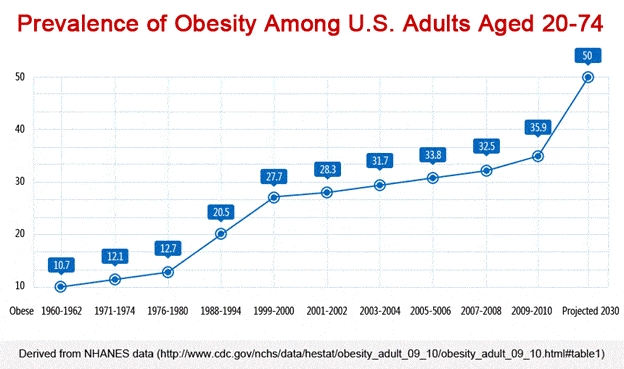
Despite Popular Opinion, Laziness Has Almost Nothing to Do with Obesity
Fifty years into the obesity epidemic, people are quick to blame excessive weight on laziness. Well, I hate to dispel what would be a convenient explanation (although one that blames the individuals suffering with it), but obesity is not caused by laziness. Here’s what’s really going on.
A Look at the Data
First, take a look at what is happening to us as a country:

Now, ask yourself if people these days are truly any lazier than people were in the 1960s.The answer is no. In fact, researchers describe a more frenetic pace of life and more intentional physical workouts to combat obesity among U.S. adults in these modern times.
So, what accounts for the dramatic increase in obesity, if not a wholesale character flaw of laziness among everyone we know? The answer is that we have not changed – not our genetics and not what makes us tick as human beings, but that the environment in which we live has. It is both as simple and as deeply complex as that.
The Obesogenic Environment
An obesogenic environment refers to the complex interplay of factors within our surroundings that promote weight gain and obesity. These factors are incompletely understood but start and end with biochemistry, although along the way, there are additional things like physical, social, economic, and policy-related components.
Essentially, the environment we live in, including the foods we eat, the drugs we take, and the chemicals we are exposed to can change our most fundamental biochemical processes, while additional factors can either facilitate or hinder healthy behaviors related to diet, physical activity, and overall lifestyle, which in turn impact our risk of obesity.
Over the past half-century, significant changes have occurred in our environment that have contributed to the rising obesity rates globally. Some key changes include:
Pharmaceuticals
Numerous widely prescribed drugs, including antidepressants, steroids, hormonal treatments, and others, cause weight gain as a side effect. Millions of people take obesogenic drugs every day, and millions more are exposed to tiny amounts of the drugs in everything from breast milk to drinking water.
Food Staples Like Wheat
Around the time the obesity epidemic exploded, we began consuming an entirely different strain of wheat, known colloquially as dwarf wheat. Some researchers believe an unintended consequence of breeding the wheat and other staples like rice, soy, and corn to have higher yields and better storage quality was that they interfere with normal metabolism and lead to increased fat storage in the body.
Other Obesogens
These are chemicals that can disrupt the endocrine system and interfere with metabolism, leading to weight gain and obesity. While we do not yet know which, if any, of these are playing a role in the obesity epidemic, these chemicals abound in our environment.
There is reason to suspect that exposure to chemicals like Bisphenol A (BPA), phthalates, perfluorinated chemicals (PFCs), organophosphate pesticides, and polychlorinated Biphenyls (PCBs) may lead to weight gain. The mechanisms through which these chemicals influence obesity are still being investigated, and individual susceptibility can vary based on genetics, timing of exposure, and other factors.
From a nutrition standpoint, artificial sweeteners are consumed widely and have been suggested to interfere with appetite regulation and the body’s ability to process sugars. This disruption could potentially contribute to overeating and weight gain.
Sugar and high-fructose corn syrup, meanwhile, are likely the biggest culprits in causing obesity, especially since they are found in high quantities in everything from beverages to salad dressings. Beware of lots of “low-fat” foods that contain a lot of these deadly carbs. They may be low fat, but you will not be.
Other Causes of the Obesity Epidemic
The obesity epidemic is complex and multi-faceted. In addition to the list of environmental changes above, there are other factors in play.
Gut Microbiome
Our gut has a whole lot of bacteria that live there and exert an effect on our energy use and storage. A shift to some populations of bacteria is associated with increased obesity. Things like antibiotics push our system there.
Dietary Patterns
There has been a shift towards consuming diets that are energy-dense and specifically tested and engineered to produce neurochemical experiences of pleasure. The availability and consumption of highly processed foods, sugary beverages, and fast food have increased dramatically. These foods are frequently high in calories, fats, added sugars, and low in essential nutrients.
Portion Sizes
Portion sizes of food and beverages have grown substantially, both in restaurants and at home. Larger portions can lead to increased calorie intake, contributing to weight gain.
Sedentary Lifestyle
Technological advancements have led to more sedentary behavior despite working harder. Many people are spending more time in front of screens – whether for work, entertainment, or communication – and less time engaging in physical activities.
Urbanization
Rapid urbanization has led to changes in transportation patterns and work environments. Increased reliance on cars and desk jobs has reduced opportunities for physical activity.
Marketing and Advertising
The food industry’s marketing and advertising strategies often promote unhealthy foods, especially to children. These tactics influence food preferences and choices.
Accessibility and Convenience
Unhealthy foods have become more accessible and convenient than healthier options in many places. Fast food outlets and vending machines are often more prevalent than grocery stores offering fresh produce.
Social Norms
Changes in social norms can impact eating habits. For instance, larger portion sizes are sometimes seen as better value for money, and consuming certain unhealthy foods is normalized.
Economic Factors
Socioeconomic status can influence obesity risk. Healthier foods can be more expensive and less accessible, pushing lower-income individuals towards cheaper, calorie-dense options.
Built Environment
Urban planning can affect physical activity. The lack of availability of safe and accessible parks, sidewalks, and recreational spaces can impact how much physical activity people engage in.
Policy and Regulation
Policy changes related to food labeling, advertising, school nutrition, and urban planning can play a significant role in shaping the environment. Positive policy changes can help create a healthier environment.
Medical Conditions
Certain medical conditions and medications can lead to weight gain or make weight loss more challenging. Conditions like polycystic ovary syndrome (PCOS), hypothyroidism, and certain medications for mental health issues can affect metabolism and contribute to obesity.
The Bottom Line
The obesity epidemic isn’t about laziness. It’s a complex issue influenced by a combination of food supply, environmental factors, metabolism, socioeconomic conditions, and psychological aspects. Blaming laziness completely misses the true causes, oversimplifies the problem, and fails to address the root causes of obesity.
It’s important to approach the topic with a comprehensive understanding of these factors to develop effective strategies for prevention and treatment.
Let’s Have a Conversation:
Do you think there is a root cause of obesity that runs deeper than “being lazy”? What factors contribute to obesity? Have these factors influenced your health and weight?







Eye opening article. Thank you for helping me realize that perhaps my weight struggles may not be all my fault.
I agree. Yes we have to take responsibility to some extent but the very nature of the food being grown, refined, processed can often work against our bodies.
Excellent article. I believe that environmental toxins are killing us slowly, along with ultra-processed foods. When I started teaching in 1969, I never saw an overweight child. By the time I retired in 2012, at least 1/3 of each classroom’s students were overweight or clearly obese. Our future will be full of unwell adults who will not live as long as our parents did or that we will.